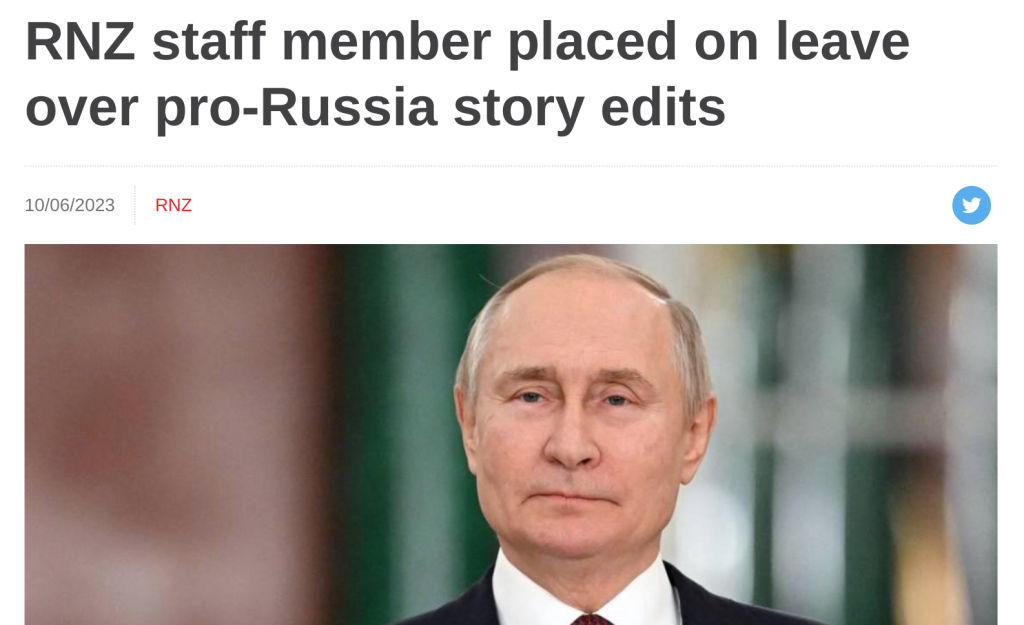But one expert believes it could be the beginning of a narrative shift to prepare the public for NATOs exit from Ukraine.
I never thought I would see such a flagrantly open admission of the news media’s role as state propaganda arm as I did last week.
RNZ Staff member placed on leave over pro-Russia story edits.
It may as well have read: RNZ reporter deviates from approved talking points.
I would prefer: RNZ does journalism, achieves balance.
It was the clearest example of the neo-McCarthyism that is now extant in the west, and it’s utter normalisation. Russia bad, everyone else good. That’s the extent that they want readers to think about this issue. In simple binaries, using juvenile-level language.
It demonstrates a startling lack of self-awareness from the broadcaster. Either that, or an astute understanding of its new role as a demoralised institution.

It’s not plausible that RNZ heads would be unaware of the complete debunking of Russiagate by the Columbia Journalism Review earlier this year (listen to an interview with the journalist here), or the Twitterfiles, which put Russia’s apparent election meddling and supposed propagandising of the US population well and truly to bed.
So they just ignore them, and pretend their audience is ignorant.
Russiagate was a fabrication. The idea, as The Disinformation Project research director Sanjana Hattotowa suggests, that Russian propaganda is entrenched in New Zealand is frankly laughable. Many of us remember when it was a truism that there are two sides to every story.
“Tut tut”, I can hear Hattotuwa murmuring. ‘There is only the one I say there is.”
What we have here is a case of an honest reporter – one honest reporter among thousands – who edited the Reuters wire for balance and missing facts. Context was needed too, so the public could really understand the realities of the Ukraine war and what led to it, and what’s been happening since it began in February last year. That broad context is what the reporter could not possibly provide in the current environment. On their own, the reaction to the edits will have already had a significant chilling effect in newsrooms and on public discourse.
As a Five Eyes partner, it’s hardly surprising that we are getting in line behind the war hawks in Washington, but there used to be a maturity to public discourse in New Zealand, and a certain sophistication in newspaper commentary. It’s gone.
And in our alternative media, those loosely in the ‘freedom’ tent, there was a contingent who clearly buy the Russia-as-antichrist narrative and justifications for the occupation of Palestine and the ongoing human rights abuses of its population.
Max Blumenthal of Grey Zone did a fantastic takedown thread a few days ago, pointing out some established facts that RNZ no longer believes it can acknowledge in print, including the fact that neo-nazisim is alive and well in Ukraine, or that Russia annexed Crimea after a popular referendum.
Similarly, Consortium News commented on the bizarre behaviour of our once esteemed national radio broadcaster.
“The malign ghosts of Orwell’s 1984 stalk this story…
“This unnamed person in RNZ committed the cardinal sin of “inappropriate editing” of incoming Reuters news feeds on the war in Ukraine to insert “Russian garbage” in the contemptuous words of Paul Thompson, chief executive of RNZ. That is to say, they drew on Russian news sources to insert balancing pro-Russian material to the incoming Western news agency feeds…
“Clearly these editors have not delved very deeply into the Ukraine story.”
Consortium News correctly concludes that the reporter’s crime was giving voice to the “wrong side”.
I approached Propaganda expert and expat Kiwi Greg Simons, who provides regular commentary on the war, for his take on the situation.
“RNZ is firmly part of the fourth branch of government (executive, legislative, judicial and regime media). I see them as performing a role that is not dissimilar from any autocratic or totalitarian state. It is a bullhorn of signalling the intent and demands of the political regime.”
He then turned to the war in Ukraine and inferred that the RNZ situation could be part of a wider change in legacy media coverage, in terms of what they say and how they say it. As Edward Bernays wrote in 1947, there is no coincidence in the nature or the timing of news.
In Simons’ view, the war is proving too politically costly, and the US is likely to dump Ukraine and walk away. Something they have a long history of doing with client states and proxies once it’s no longer convenient (Osama bin Laden in the Soviet-Afghan War or Saddam Hussein in the Iraq-Iran War, for example).
“There is this stupid and irritating ideological catch phrase used in the EU(SSR) – ‘speak with one voice’. There is a likely shift coming in Ukraine policy soon, the offensive has been a predictable debacle.
“In my understanding, the narrative shift is not without rhyme or reason. This is something being done on a wider scale too, which means it is being coordinated and therefore approved. My educated guess is that there soon shall be a policy change on the Ukraine War, which of course is coordinated from Washington DC.”
Thus, in preparing for the off-ramp, perceptions need to be changed. Simons says the intent is to shift it away from the idea of continuous war in Ukraine against Russia, or a Ukrainian victory, which had been hammered in relentlessly for the last year. The result is cognitive dissonance.
“There needs to be a significant cognitive shift in Western audiences to permit the policy shift, they are using the public information space to do this at this very moment,” he says.